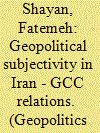| Srl | Item |
| 1 |
ID:
123715


|
|
|
|
|
| Publication |
2013.
|
| Summary/Abstract |
This article enters into the debate about geopolitical subjectivity between Iran and the members of the Gulf Cooperation Council (GCC) on the three islands issue. The islands at the Western entrance to the Strait of Hormuz have so far been examined as an issue between Iran and the United Arab Emirates from historical, sovereignty and law perspectives, but this article examines the argument that the GCC has become a geopolitical subject through its support for the US policy of isolating Iran. Geopolitical subjectivity, a concept building on Pami Aalto's conceptual scheme, is the concept of goal-oriented ordering of territories and political space. We can use it to identify the GCC institution as a subject with the ability to act (and abstain from acting) and to examine Iran's response to the GCC's willingness to order the three islands. The conclusion is that the GCC became a subject in this context as soon as it felt the benefits of US support and the current rise of the soft power of Qatar. Even so, it has been unable to undermine Iran's sovereignty rights over the three islands, and the issue has strengthened, even exaggerated, states' adherence to the concept of sovereignty throughout the Persian Gulf region.
|
|
|
|
|
|
|
|
|
|
|
|
|
|
|
|
| 2 |
ID:
124712


|
|
|
|
|
| Publication |
2013.
|
| Summary/Abstract |
I had two New Year's resolutions in 2011: to read Leo Tolstoy'sAnna Karenina and Marcel Proust's In Search of Lost Time. Annawas completed by Jan. 25 -- just when our lives turned into a 24-hour TV marathon tuned to Cairo's Tahrir Square as the world watched a dictator fall in 18 short days. We Syrians knew our country was not Egypt or Tunisia, but when even Libya ignited on Feb. 15, we collectively held our breath with hope. The weeks passed, the uprisings around the Arab world grew larger and more determined, and the seven volumes of Proust slowly collected dust on my nightstand
|
|
|
|
|
|
|
|
|
|
|
|
|
|
|
|
| 3 |
ID:
133616


|
|
|
|
|
| Publication |
2014.
|
| Summary/Abstract |
In the late 20th century, 300 Mauritanian shepherds travelled to the United Arab Emirates in order to tend the herds of some of that country's most prominent leaders. These low-tech subjects of global migration flows were particularly valued and sought after by their Emirati employers for their expertise in raising camels. I analyse the forms and consequences of this migration, focusing on the reintegration of these shepherds into Mauritanian stratified tribal spheres following their return to the Sahara. The possibility of a change in their social status (after a financially rewarding experience in the Gulf) will be a central theme of this article. This issue arises from the pervasive designation of these shepherds as a 'tributary' (zn?ga) group, through the application of the tripartite social model that, to a large extent, still defines Mauritania's arabophone population.
|
|
|
|
|
|
|
|
|
|
|
|
|
|
|
|